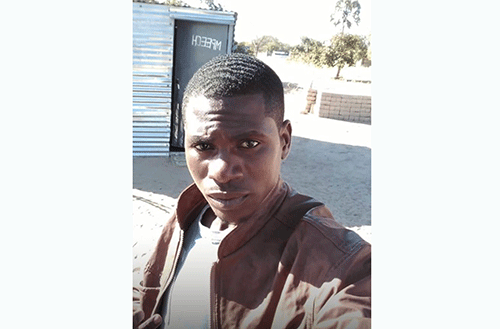ONGWEDIVA – For his entire life, Nghidipo Rafael has had to prove that he indeed exists.
The 29-year-old from Outaukondjele village in the Ohangwena region was born from Namibian parents, yet he is stateless. This fact has made him live a life of hardship and poverty.
A stateless person is someone who is not considered a national of any state. Government estimates that there are 50 000 stateless persons in Namibia.
“I have been living in a dilemma my whole life. My existence is absolutely unknown,” he lamented.
To Nghidipo, statelessness is his inheritance.
His maternal grandparents didn’t have a nationality, something which was then inherited by his mother, and subsequently flowed over to him and his three siblings.
This issue is likely to be passed on to his children, if he decides to have any.
His father, who is believed to still be alive, did not acknowledge paternity.
“I only hear that my father is a certain Raphael, but I don’t know him. I don’t even think that he knows that my siblings and I exist,” he added.
In Namibia, like many countries, the identity of biological parents is one of the most crucial key pieces of information to prove one’s ties to a country, and exercise the right to citizenship.
He finds the ordeal so upsetting as he feels like a foreigner in his own country.
With no legal identity, Nghidipo is unable to access some of the vital basic services such as enrolling in school, getting employment legally or access public services and healthcare, obtaining travel documents, getting married, or even have his death registered in case he perishes.
“I have never attended school, and I cannot exercise my constitutional rights because I don’t belong anywhere,” he said.
Being born in a Christian home, Nghidipo said he feels left out as he didn’t partake in crucial practices of his religion, which is to be baptised and confirmed.
He also cannot travel, as he fears interrogation by law-enforcement officials.
One of his biggest fears is having a child.
“I can’t have children because they will fall into the same limbo. I don’t want my children to go through what my siblings and I have gone through,” he stated.
Asked whether he attempted to seek help for his plight, he said his attempts have proven futile.
“I have been fighting for my nationality for over a decade now, with no attainment.”
Currently, Nghidipo works as a bricklayer in his hometown.
“Landing that job was also an uphill climb. Luckily, the owner of the company is from my village, otherwise I would still have been unemployed.”
Nghidipo’s siblings were fortunate to acquire their national documents, though it also came late in their lives.
His big brother, Gabriel Nghotokepo (30), acquired citizenship at the age of 20. He then attended a literacy programme the same year until he turned 26. He is now employed as a security guard, and also runs a motorbikes’ garage in Oshakati.
Similarly, his other sibling Nghotokepo Nghotokepo (26) acquired citizenship when he turned 18.
Nghidipo is not aware of how his siblings acquired citizenship. He is also not familiar with their surname “Nghotokepo”, and is not interested in carrying the same name as them.
He is, however, eager to start building the life he always dreamed of, and to feel like he belongs.
“My biggest wish right now is to have national documents, and start living like other Namibians. Right now, I am not doing much with my life,” he continued.
At the moment, Namibia has no blanket provision in place to cater for stateless people – neither in its constitution, nor in its Namibian citizenship legislation.
Late last year, the Ministry of Home Affairs and Immigration launched a national migration policy that will be implemented at a cost of N$140 million over five years.
The policy will, among others, amend relevant laws related to stateless persons, and will adopt general protection strategies for children born in the country without any other nationality.
In a telephonic interview with New Era, deputy home affairs minister Daniel Kashikola said the issue of statelessness is receiving priority at the moment.
“We have been directed by Cabinet to ensure that we eliminate the issue of statelessness and undocumented people sooner rather than later,” he noted.
Kashikola added that the ministry embarked on a qualitative study to determine the status of statelessness in Namibia.
“The study confirms that there are indeed undocumented people in Namibia, who are at risk of being stateless. After the study, we will locate these people, in collaboration with the regional authorities,” he said.
Kashikola could, nonetheless, not confirm the statistics of how many people are undocumented/stateless in Namibia.
He estimated these people to be about 50 000.
“It is quite a large number,” he added.
In respect of the instruction from Cabinet, Kashikola said the ministry plans to eliminate statelessness by the end of 2025.
“Firstly, we will embark on the implementation of the law or the migration bill, which is at the drafting level,” he stated.
Kashikola expressed concern that the majority of undocumented people in Namibia are from Angola.
“Most of these people are not documented in their country of origin, neither are they documented here. So, they are likely to fall into statelessness,” he observed.
-ashikololo@nepc.com.na


